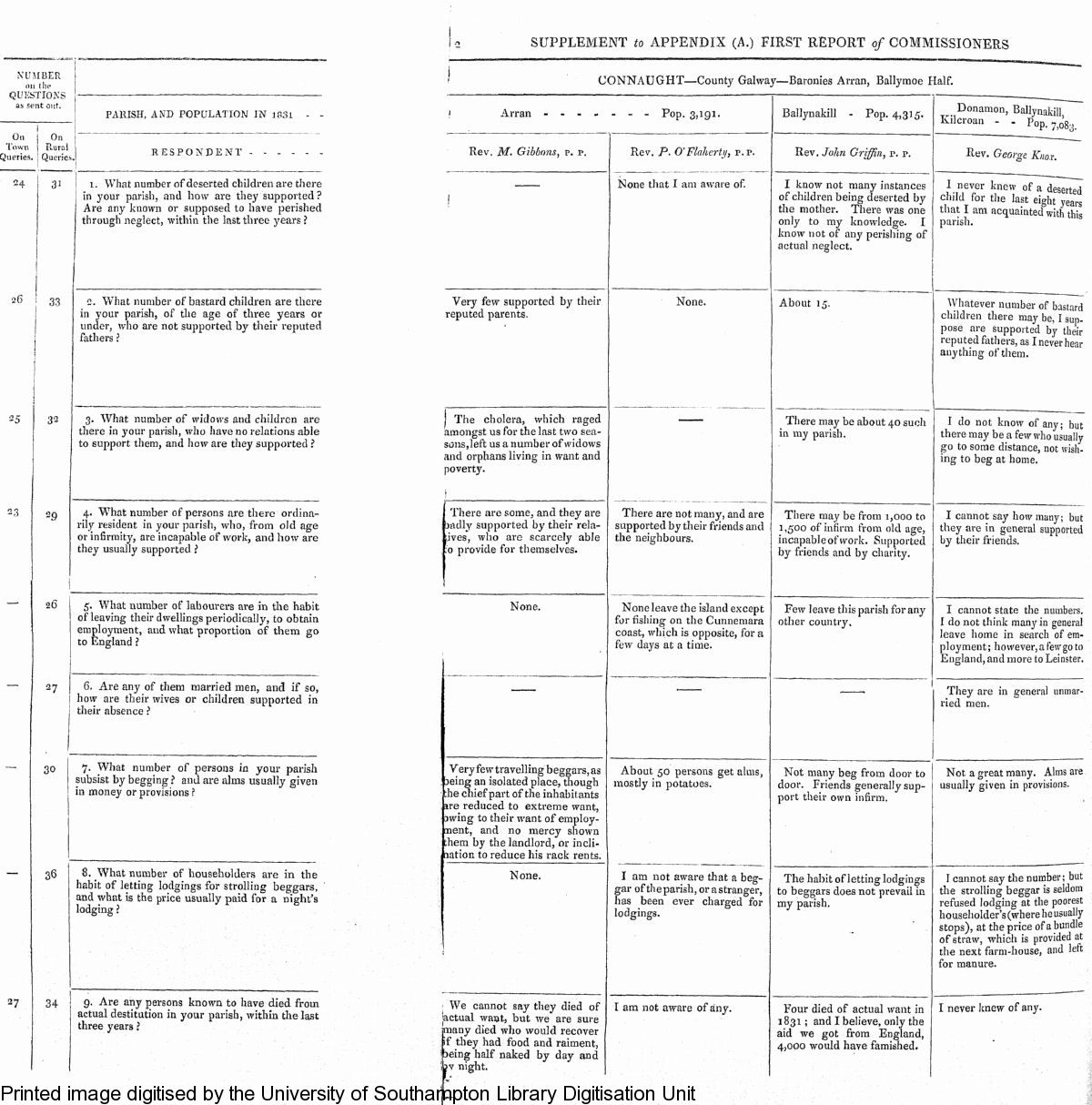PARISH, AND POPULATION IN 1831
-RESPONDENT
i.
What number of deserted children are there in your parish, and how are they supported ?
Are any known or supposed to have perished through neglect, within the last three years ?
2.
What number of bastard children are there in your parish, of the age of three years or under, who are not supported by their reputed fathers ?
3.
What number of widows and children are there in your parish, who have no relations able to support them, and how are they supported ?
4, What number of persons are there ordina¬ rily resident in your parish, who, from old age or infirmity, are incapable of work, and how are they usually supported I
5.
What number of labourers are in the habit of leaving their dwellings periodically, to obtain employment, and what proportion of them go to England ?
6.
Are any of them married men, and if so, how are their wives or children supported in their absence 1
7.
What number of persons in your parish subsist by begging ?
and are alms usually given in money or provisions ?
8.
What number of householders are in the habit of letting lodgings for strolling beggars, and what is the price usually paid for a night's lodging ?
9.
Are any persons known to have died from actual destitution in your parish, within the last three years ?
SUPPLEMENT to APPENDIX (A.)
FIRST REPORT of COMMISSIONERS
CONNAUGHT—County Galway—Baronies Arran, Ballymoe Half.
1 Arran Pop.
3,191
Rev.
M.
Gibbons, p.
p
Very few supported by their reputed parents.
The cholera, which raged amongst us for the last two sea¬ sons,left us a number of widows and orphans living in want and poverty.
There are some, and they are tmdly supported by their rela¬ tives', who are scarcely able ,0 provide for themselves.
None.
Very few travelling beggars, as Deing an isolated place, though :he chief part ofthe inhabitants are reduced to extreme want, swing to their want of employ¬ ment, and no mercy shown them by the landlord, or incli¬ nation to reduce his rack rents.
None.
We cannot say they died of 'actual want, but we are sure pany died who would recover pf they had food and raiment, 3eing half naked by day and 3v night.
Rev.
P.
0'Flaherty, p.p.
None that I am aware of.
None.
There are not many, and are supported by their friends and the neighbours.
None leave the island except for fishing on the Cunnemara coast, which is opposite, for a few days at a time.
About 50 persons get alms, mostly in potatoes.
I am not aware that a beg¬ gar oftheparish, or a stranger, has been ever charged for lodgings.
I am not aware of any.
Ballynakill -Pop.
4,315.
Rev.
John Griffin, p.
p.
I know not many instances of children being deserted by the mother.
There was one only to my knowledge.
I know not of any perishing of actual neglect.
About 1.*..
There may be about 40 such in my parish.
There may be from 1,000 to 1,500 of infirm from old age, incapable of work.
Supported by friends and by charity.
Few leave this parish for any other country.
Not many beg from door to door.
Friends generally sup¬ port their own infirm.
The habit of letting lodgings to beggars does not prevail in my parish.
Four died of actual want in 1831; and I believe, only the aid we got from England, 4,000 would have famished.
Donamon, Ballynakill, Kilcroan --Pop.
7)0§ ,_
Rev.
George Knox.
1 never knew of a deserted child for tlie last eight years that I am acquainted with this parish.
Whatever number of bastaid children there may be, I sup-pose are suppoited by their reputed fathers, as I never hear anything of them.
I do not know of any; but there may be a few who usually go to some distance, not wish¬ ing to beg at home.
I cannot say how many; but they are in general supported by their friends.
I cannot state the numbers.
I do not think many in general leave home in search of em¬ ployment; however, a few go to England, and more to Leinster.
They are in general unmar¬ ried men.
Not a great many.
Alms are usually given in provisions.
T cannot say the number; but the strolling beggar is seldom refused lodging at the poorest householder's (where he usually stops), at the price of a bundle of straw, which is provided at the next farm-house, and left for manure.
I never knew of any.

